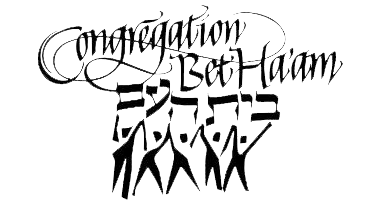by Catherine Share, congregant
Last year at this time, I was thinking about the approaching High Holy Days. I was on my path to conversion and I was considering a daily practice that would make the time more meaningful.
The previous winter, I had read This is Real and You Are Completely Unprepared, by Rabbi Alan Lew. It had been recommended to me by a woman I had met on a cycling trip in Death Valley (of all places). When I met her, the High Holy Days were long past, but she had been confident that I would find the book rewarding, no matter what time of year I read it. She too was converting to Judaism; she attended a small reform shul in Oregon. I found the book pretty difficult to absorb and I realized that it was probably written for someone who had experienced many High Holy Day seasons and who might be looking for guide to help bring new meaning and spiritual evolution.
So, last year, I was looking for something that would speak to me as a daily spiritual practice. I don’t remember where I read about reading Psalm 27 twice daily from the beginning of Elul through the end of Sukkot. It seemed to be pretty daunting practice and I felt as if I would need some kind of guide to lead the way. That is when I discovered Opening Your Heart with Psalm 27: A Spiritual Practice of the Jewish New Year, a book by Rabbi Debra Robbins. I ordered the book from the CCAR website and upon receiving it, I realized I was getting a late start. It was already the middle of Elul. But I never thought my practice would be perfect. Instead, I was looking for something meaningful. So I jumped in without hesitation.
But why Psalm 27 and who came up with the idea for this time of year? It was first mentioned by Rabbi Ya’akov Emden in 1745, and by Rabbi Shabtai Rashkov, a pupil of the Baal Shem Tov. I have read several justifications for the choice, but what makes the most sense to me is that the author, presumably King David, is seeking assurances that despite his fear of pursuers, adversaries, and evildoers, he will “look upon the sweetness of Adonai” and live in Adonai’s house all the days of his life. David knows that Adonai will hide David in a sukkot or raise him “high upon a rock…high above [his] enemies roundabout.” What greater assurances could we ask for in this time of COVID-19?
I must admit the practice of reading Psalm 27 each day was not easy. My Hebrew was pretty rough and so it took me a lot of patience just to read through the psalm in Hebrew and then to read it again in English. Rabbi Robbins takes the psalm apart verse by verse and writes a short daily meditation on it. Her hope is that, as with all spiritual practices, we will “try and fail and try again, fail again and try and try and try.” I definitely did that, and by the end, I looked forward to reciting the psalm in Hebrew and English, reading her meditation, and writing my own thoughts. On the last day I wrote, “Some days I was distracted and couldn’t concentrate on the reading or the thinking. But this is a discipline and it doesn’t come easy.” In the end, Robbins suggests a daily mantra: “Chazak—be strong; v’yaameitz—be courageous; libecha—follow your heart.” Now I say this every morning after the birchot Hashachar (morning blessings) and every night before the shema (prayer affirming God’s singularity). I see this as wise work and a wise discipline. It is worth all the effort I give to it.
Photo by Andrew Buchanan on Unsplash

